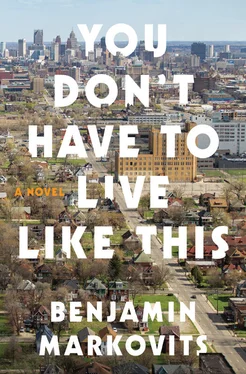The front lawns on Whittier were bigger than any yard she’d ever played in. The houses were made of those bricks they build schools out of, with white plantation shutters on either side of the windows. Once or twice her father had invited one of his colleagues from the UAW back to their apartment, a white guy, another lawyer, but her parents didn’t do much entertaining, and the people they had round were mostly family or from church. In other words, when she was seven years old she didn’t know any white people to talk to.
There are sidewalks on both sides of Whittier Road, but they don’t get much use. Everybody drives. A few people must have got in their cars while Gloria was sitting there, but nobody stopped by or said anything until a cop pulled over by the side of the road.
By that point her father was dead. When the ambulance eventually came they took Gloria to the hospital with him and checked her temperature and gave her something sugary to drink. Her father lay on the gurney with a blanket over him, as if he was cold. That seemed weird to her; she was sweating. Then her mother came to the hospital and a few hours later took her home again without him.
Years later she got into one of those stupid teenage arguments you get into with your mother. Here’s what her mother said: that if Gloria had gotten help sooner, her father might still be alive. At Michigan Gloria looked into this a little — one of her roommates was premed. Her roommate told her that they probably had ten or twelve minutes to respond, after the coronary event. In other words, unless the first door she knocked on had a doctor in the house, or somebody who knew CPR, there was probably nothing that Gloria could have done to save her father. Even if they called an ambulance immediately it would probably have come too late.
But Gloria still thought about why she hadn’t asked for help. When the cop came over she was just sitting on the side of her bike spinning one of the wheels. She had wet herself and still remembered the feeling of not being able to hold it in and letting go. It was a hot July morning and getting hotter. By the time her mother drove her home she was totally dry — she didn’t even get changed. If they had gone biking that morning in Jefferson Chalmers or Morningside, she’s pretty sure she would have knocked on somebody’s door when her father fell over. But she didn’t because she was shy of white people, and nothing any white person had ever said or done to her was a good enough excuse.
I said to her, “There’s another way of reading this story. I can’t believe nobody came out to see what was going on.”
“When a kid screams, how often do you check to see what’s wrong? Even if you do look, you see a man lying down beside her.”
“If you were white,” I said, “somebody checks. Some mother would consider it her responsibility. Some busybody, some neighbor.”
“Where he fell down was next to a tree. So from one side you couldn’t see us too well, and from the other side was across the road.”
“If you were white, somebody stops the car, they get out and look.”
“I know you mean well,” Gloria said. “But I don’t want it stirred up like that. Please stop.”
We were sitting in her living room, on two of the chairs. Gloria felt hungry when we got in from Robert’s party — she made us something to eat and lit candles and all that. Afterwards we sat over a bottle of wine.
The conversation was a mood killer, but I spent the night at her place anyway. I don’t sleep well in other people’s beds, and her bedroom was small. It was kind of a good little girl’s room, very plain and neat. She had a single in it, and I lay on my back all night with my eyes closed, trying not to move and wake her. Then when it got light she made me take off. On Sunday mornings she had a weekly date with her mother to go to church. The early morning service started at nine a.m. This is the one her mother liked to go to, because there weren’t any kids, and afterwards the two of them had breakfast together. So I said, “Can I call you later?”
And she said, “Please, call me.”
Then I put on last night’s clothes and carried my tie in hand and walked out. It was cold in the stairwell, I could see my breath in the one landing light still working, but outside didn’t feel much colder. The air was still, and snow had fallen overnight and covered the roof of my car and tufted the side mirrors. I palmed off the snow with bare hands. The sun hadn’t made it yet over Gloria’s apartment block, but the rest of the street, up and down, showed the line between sunshine and shade very vividly. On the west side, on the Detroit side, the milk-carton houses sat in brilliant light.
Snow lay about a foot thick in the middle of the road, so I decided to leave the car and walk home. It took much longer than I thought. I ended up on Mack Avenue, where the storefronts and service stations and jury-rigged churches eventually gave way to concrete sidings topped with chain-link fences. By this point it had become a six-lane highway. There were train tracks running underneath it and some kind of industrial plant spread out alongside. But the parking lot had no cars in it, just heaps of garbage, rubble and tires, and pileups of snow. I started to feel scared. I was also hungover and sleep-deprived. The world seemed very large around me, not just the planet itself but the number of people, the scale of buildings and the general infrastructure, highways and tracks and office blocks and container depots. It’s almost impossible to keep your sense of proportion, you come out too small, so you have to combat how little anything matters with your most unreasonable voice, saying, it matters, it matters, it matters. These are the stupid thoughts that went through my brain. I could still taste Gloria’s mouth in my mouth, my feet were wet and numb, and then I passed the twenty-four-hour McDonald’s on the corner of Conner Street and went in for a pancake breakfast and Styrofoam cup of tea. Later I got Walter to drive me back and picked up the car.
There was a message on my answering machine, but I didn’t listen to it till I went to bed, which was early, about nine o’clock. My brother wanted to know if I was coming home for Christmas. He couldn’t get away with the kids (he has three of them) and the house in Baton Rouge was too small. Andrea had put her foot down, and Mom didn’t want to commit to Christmas in Houston until she had heard from me. Of course, I was welcome to sleep on his couch if I wanted to, but regardless, I should let Mom know. I should call her anyway, just give her a call, he said. She’s building this whole thing up into something it’s not. It’s stressing her out.
My father offered to pay for my flight. Walter and Susie had also invited me to spend Christmas with them, but life seemed pretty tense downstairs. She was under doctor’s orders to stay in bed until the baby was born. Her due date was six weeks off and Walter not only had to run the kids’ workshop himself but also look after her — clean house, go shopping, bring her meals. She was taking this bed rest thing very seriously and shuffled around instead of walking, when she had to go to the bathroom, for example. I said once, how do you feel, do you feel weak, does something hurt, but she said, looking up, I just feel worried. Worried people can walk, I thought, but didn’t say anything. Walter looked strung out. So I took my dad’s money and flew home.
Home felt weird to me, too. My mother made meat loaf the night I got in, because it was my favorite thing to eat when I was twelve years old. After she went to bed, my dad offered me a shot of Jim Beam. We sat up watching TV and both got a little drunk. That’s what we did every night — watch TV. I didn’t tell either of them about Gloria, but all week long I had this Guess Who’s Coming to Dinner fantasy going around my head. For some reason I liked to imagine their reaction.
Читать дальше












